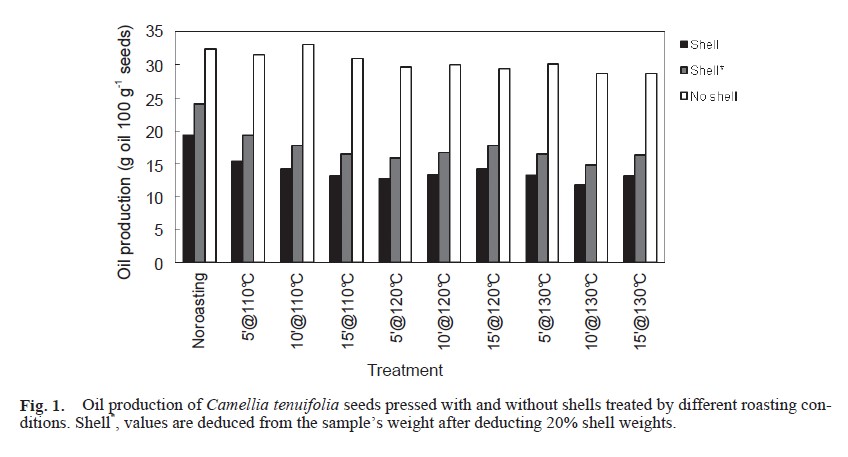All issues

Author:Ching-Ming Hsieh, Jeng-Chuann Yang, De-Shiu Chen, Yao-Chun Chuang, Eugene I-Chen Wang, and Ya-Lin Lee*
Abstract:
Camellia tenuifolia is an indigenous camellia oil tree species native to Taiwan. Its fruit is smaller in size than the big-fruit species C. oleifera. With a lower annual oil yield and healthful ingredients to human body, the C. tenuifolia seeds oil has been considered a valuable oil to Taiwanese folklore. Generally the seeds of camellia species have a hard shell, while the shell of C. oleifera seeds is easy to make crack because of the bigger gaps between shell and seed kernel. Their seeds are also more uniform in size and the shells are easier to be removed. When processing for oil, C. oleifera seeds are usually shelled before pressing. On the other hand, seeds of C. tenuifolia have a variety of seed sizes and tough shell, with smaller gaps between shell and seed kernel. Thus, its seeds are more difficult to remove shell and hence, frequently C. tenuifolia seeds are directly pressed for oil without shelling. In this study, seeds of C. tenuifolia with or without shell were treated under different roasting conditions, from 110 to 130℃ for 5 to 10 min, and then were pressed for seed oil. Physico-chemical characteristics of the seed oils, including oil yield and stability index, acid value, peroxide value, smoke point, phenol content and reducing power, were analyzed. Results indicated that shelled seeds produced 13% more oil than that with shell on. All tested oils had acid value less than 1.0, peroxide value less than 10.0, and smoke point greater than 200℃. Results suggest that with or without the shell, the pressed oils all reached the food standard of general pressed oils. Regardless of with or without the shell, along with the increasing intensity of roasting, the phenol content and reducing power also increased. At suitable roasting treatment conditions, the oil quality will be better and oil be more stable during storage.
Key words:Camellia tenuifolia seed oil, Shell, Roasting, Oil quality, Oil oxidative stability
Download:![]() PDF Links
PDF Links
- 1. Development of Tractor-Mounted Seedling Transplanter for Sweet Potato
- 2. Synergistic Effect of Additional Gas on the Toxicity of Phosphine to Sitophilus oryzae and Sitophilus zeamais (Coleoptera: Dryophthoridae)
- 3. Effects of Temperature and Solar Radiation on Growth Traits and Plant Elements in Purple Leafy Sweet Potato
 Submit your manuscript
Submit your manuscript
 Guide for authors
Guide for authors